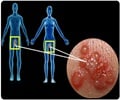A new compound has been developed to treat shingles, a condition that affects mostly elderly and for which no specific treatment exists.

Most adults remember the fever, itchy blisters and possibly tiny scars they experienced as children when they had chickenpox, which is caused by the varicella-zoster virus, or VZV. Unfortunately, that memory can come back-with a vengeance-when they are older.
The VZV virus from childhood chickenpox hides in the nerves, emerging most frequently in adults over the age of 60 as a blistering rash on one side of the body. The rate of complications, including nerve pain that can persist for months or years after the shingles attack is gone, also increases with age.
The novel and effective anti-shingles agent called L-BHDA may change that.
"We need new options for medications with increased potency and specificity that can treat VZV, including strains that may be resistant to existing drugs," said medicinal chemist Chung (David) Chu, distinguished research professor of Pharmaceutical and Biomedical Sciences at UGA, one of the inventors of L-BHDA.
A collaboration between Chu and co-inventor Yung-Chi (Tommy) Cheng, the Henry Bronson Professor of Pharmacology at Yale, has resulted in an extensive portfolio of antiviral compounds that target such diseases as HIV, shingles, hepatitis and cancers.
Advertisement
"We need more effective anti-VZV agents. L-BHDA has the potential to be more effective than existing agents," he said.
Advertisement
Source-ANI








